|
|
|
Sort Order |
|
|
|
Items / Page
|
|
|
|
|
|
|
| Srl | Item |
| 1 |
ID:
067168
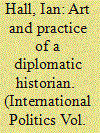

|
|
|
| 2 |
ID:
189743


|
|
|
|
|
| Summary/Abstract |
Australian and British strategic interests diverged after the early 1970s. As London’s horizons narrowed, Canberra held tight to Australia’s alliance with the US and looked to emerging Asia for economic opportunities. Recently, however, Australian and UK strategic interests have reconverged, as concern grows in both countries about China’s growing assertiveness. The AUKUS arrangement is the clearest signal of this shift, but, as Ian Hall argues, the substance of Australia–UK strategic cooperation in the Indo-Pacific is yet to be determined and several challenges loom.
|
|
|
|
|
|
|
|
|
|
|
|
|
|
|
|
| 3 |
ID:
170257
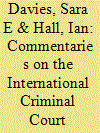

|
|
|
|
|
| Summary/Abstract |
In this Issue we are excited to share with our readers four outstanding pieces that examine the ‘for’ and ‘against’ arguments on the recent International Criminal Court decision (September 2018) to investigate and prosecute crimes against humanity committed against the Rohingya people, who fled Myanmar into Bangladesh in late August 2017.
We have published two commentaries that are in favour of the ICC decision: Victoria Colvin and Phil Orchard, University of Wollongong; Melinda Rankin, University of Queensland, and Kip Hale, Atrocity Crimes Investigations. We have also published two commentaries that adopt a (nuanced) against position on the ICC decision: Douglas Guilfoyle, UNSW Canberra at Australian Defence Force Academy (ADFA); Morten Pedersen, UNSW ADFA. These are outstanding pieces. We hope you enjoy reading them.
|
|
|
|
|
|
|
|
|
|
|
|
|
|
|
|
| 4 |
ID:
155786
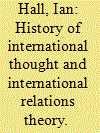

|
|
|
|
|
| Summary/Abstract |
Over the past two decades, historians of international thought have markedly improved our understanding of the disciplinary history of International Relations (IR) and its wider intellectual history. During that period, ‘contextualism’ has become a leading approach in the field, as it has been for half a century in the history of political thought. This article argues that while the application of contextualism in IR has improved our understanding of its disciplinary history, its assumptions about the proper relationship between historians and theorists threaten to marginalise the history of international thought within IR. It argues that unless the inherent weaknesses in contextualism are recognised, the progress made in the field will go unrecognised by a discipline that sees little reason to engage with its history. It suggests that historians of international thought adopt an extensively modified version of contextualism that would allow them to rebuild bridges back into IR, especially IR theory.
|
|
|
|
|
|
|
|
|
|
|
|
|
|
|
|
| 5 |
ID:
184662
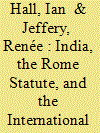

|
|
|
|
|
| Summary/Abstract |
Despite its long-standing rhetorical support for an international criminal justice regime, India continues to resist signing the 1998 Rome Statute that created the International Criminal Court. This article explores the reasons for this reluctance. It observes that during the negotiations that led to the Rome Statute, India voiced multiple objections to the design of the ICC, to how it was to function, and to the crimes that it was to address. It argues that analyzing the negotiating strategy India employed during those talks allows us to discern which reasons mattered more to New Delhi and what accounts for India’s ongoing refusal to sign the Rome Statute.
|
|
|
|
|
|
|
|
|
|
|
|
|
|
|
|
| 6 |
ID:
117656
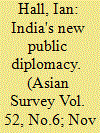

|
|
|
|
|
| Publication |
2012.
|
| Summary/Abstract |
Over the past decade, India has invested significant resources in public diplomacy, using traditional and new approaches to build and leverage its soft power. This article examines the reasons for this investment, the various forms of public diplomacy India employs, and the effectiveness of its efforts to shape public opinion. It finds that Indian investment in public diplomacy is partly a response to concerns about the perceived growth of Chinese soft power and partly a function of changed beliefs in the foreign policy-making elite about the uses of new social media. It also finds that India's new public diplomacy seems to have met with some--albeit patchy--success in augmenting its soft power.
|
|
|
|
|
|
|
|
|
|
|
|
|
|
|
|
| 7 |
ID:
170071
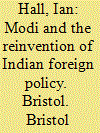

|
|
|
|
|
| Publication |
Bristol, Bristol University Press, 2019.
|
| Description |
xiii, 221p.pbk
|
| Standard Number |
9781529204629
|
|
|
|
|
|
|
|
|
|
|
|
Copies: C:1/I:0,R:0,Q:0
Circulation
| Accession# | Call# | Current Location | Status | Policy | Location |
| 059803 | 327.54/HAL 059803 | Main | On Shelf | General | |
|
|
|
|
| 8 |
ID:
153836


|
|
|
|
|
| Summary/Abstract |
Periodically, India has sought to act as a ‘normative power’ in international affairs, advancing a normative agenda about how states and other actors ought to behave, what norms and rules should regulate their interactions, and what institutions should exist to make and enforce them. The rise to power of Narendra Modi, who became India's prime minister in May 2014, with a declared aspiration to once more make India a vishwaguru (‘world guru’) and a ‘leading power’, has generated debate about whether India will again become a normative power. This article analyses the intellectual resources with which Modi might construct that new normative agenda. These resources include the work of a number of key Hindu nationalist thinkers with whom Modi is well acquainted, but also the thought of Swami Vivekananda, for whom Modi claims a special devotion. The article concludes that constructing a new normative agenda for a revived ‘normative power India’ out of these resources will be difficult, given the limited usefulness of these intellectual resources, and that Modi's government will likely continue to pursue an essentially pragmatic foreign policy designed above all to further India's domestic economic development.
|
|
|
|
|
|
|
|
|
|
|
|
|
|
|
|
| 9 |
ID:
171927


|
|
|
|
|
| Summary/Abstract |
Official figures claim that almost 3000 people were killed, and many more injured or displaced, in four days of rioting aimed at the Sikh population of Delhi in late October and early November 1984 following the assassination of Indira Gandhi. This article analyses the efforts made to address the human rights violations that occurred. It argues that as a divided democracy, India has struggled to do justice to the victims, despite multiple commissions of inquiry, compensation schemes and a prime ministerial apology. It argues that this has occurred not simply because of challenges commonly faced by democracies dealing with similar incidents, but also because of the particular problems faced in a context in which we see continuity of rule by a political elite allegedly implicated in the abuse and in which there is acute concern for the survival of a fragile divided polity.
|
|
|
|
|
|
|
|
|
|
|
|
|
|
|
|
| 10 |
ID:
140978


|
|
|
|
|
| Summary/Abstract |
While recent history arguably demonstrates a high level of nuclear stability in South Asia, this article argues that this stability has historically been a function of India's relative weakness. It argues that, as India becomes stronger, attention must be paid to the technical and political requirements of nuclear stability: the reliability of weapons and command and control and the political conditions that underpin stable relations between nuclear-armed states. It concludes by recommending the United States aim to modify the perceptions of regional elites about their various intentions and decision-making processes and the role of the United States as crisis manager.
|
|
|
|
|
|
|
|
|
|
|
|
|
|
|
|
| 11 |
ID:
061165


|
|
|
| 12 |
ID:
119112
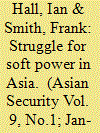

|
|
|
|
|
| Publication |
2013.
|
| Summary/Abstract |
Throughout Asia, states are competing to build and leverage soft power using public diplomacy. This article examines these investments, whether they pay dividends, and why they are being made. A mix of qualitative and quantitative analysis shows little, if any, positive correlation between public diplomacy by Asian states and foreign public opinion. We therefore ask why states invest in public diplomacy when it does not seem to work. We argue that different motives are at play: The struggle for soft power is driven by both a logic of consequences and logic of appropriateness. Lastly, we suggest how this struggle might aggravate rather than ameliorate tensions in the region.
|
|
|
|
|
|
|
|
|
|
|
|
|
|
|
|
| 13 |
ID:
131413


|
|
|
|
|
| Publication |
2014.
|
| Summary/Abstract |
Arnold J. Toynbee (1889-1975) has long been neglected or discounted by scholars of international relations and historians of international thought. Yet his contributions to International Affairs, as well as his Surveys of international affairs and his A study of history demonstrate both his capacity for acute interpretation of contemporary events and the depth of his learning about past international societies. This article examines his analysis of mid-twentieth century international relations, that 'Time of Troubles' which he believed would only be escaped through a recovery of 'creativity' and profound change in the ways in which world politics were practised. It explores the foundations of his approach to the field, demonstrated both in his Surveys of international affairs and his twelve volume magnum opus, A study of history, as well as his essays in journals. It analyses his diagnosis of the causes of our contemporary 'Time of Troubles', in the light of past episodes in world history Toynbee thought analogous to that present condition of international relations. And it traces his retreat from political solutions to the challenges faced in the twentieth century and his movement towards religious responses as a putative alternative. It concludes by arguing that Toynbee deserves recognition, not simply as a pioneering world historian or a controversial interpreter of the politics of the Middle East, but as an acute commentator on the international relations of a troubled age.
|
|
|
|
|
|
|
|
|
|
|
|
|
|
|
|
| 14 |
ID:
141219
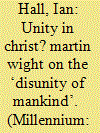

|
|
|
|
|
| Summary/Abstract |
This response to Martin Wight’s ‘Disunity of Mankind’ contextualises the essay in his wider thought and explores the Christian underpinnings of his thinking on cosmopolitanism. It argues that the essay demonstrates both Wight’s strengths – in terms of his forensic analysis of a broad range of Western texts – and his weaknesses, which flowed from his conviction that the Christian tradition, and Western values more broadly, were the best foundation for international society.
|
|
|
|
|
|
|
|
|
|
|
|
|
|
|
|
| 15 |
ID:
075439


|
|
|
|
|
|
|
|